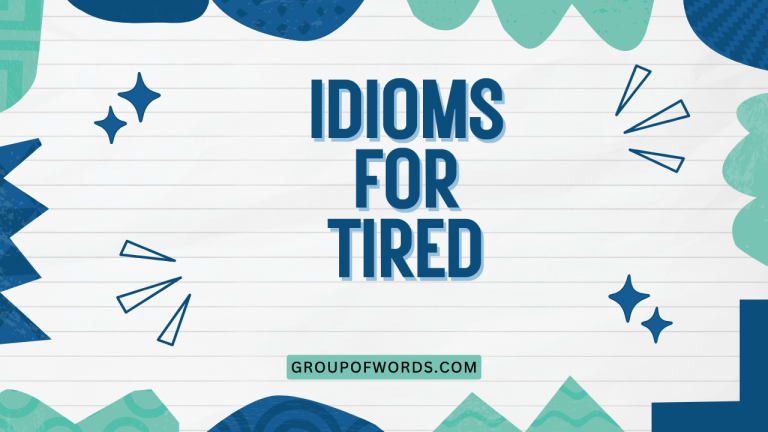Idioms About Teeth: A Comprehensive Guide
Idioms are a fascinating aspect of the English language, adding color and depth to our communication. Among the countless idioms, those related to teeth offer a unique glimpse into how we perceive strength, vulnerability, and communication.
Understanding these idioms is crucial for mastering English, as they often appear in everyday conversations, literature, and media. This article provides a comprehensive guide to idioms about teeth, exploring their meanings, origins, and usage.
Whether you’re an ESL learner or a native speaker looking to expand your linguistic repertoire, this guide will help you confidently navigate the world of dental idioms.
Table of Contents
- Introduction
- Definition of Idioms About Teeth
- Structural Breakdown
- Types and Categories of Idioms About Teeth
- Examples of Idioms About Teeth
- Usage Rules
- Common Mistakes
- Practice Exercises
- Advanced Topics
- FAQ
- Conclusion
Definition of Idioms About Teeth
An idiom is a phrase or expression whose meaning cannot be understood from the ordinary meanings of the words it contains. Idioms about teeth are a subset of these expressions that use dental imagery to convey figurative meanings.
These idioms often draw on the symbolic associations of teeth with strength, communication, and vulnerability. They can be classified based on the specific concept they represent, such as strength, speech, difficulty, or value.
The function of idioms about teeth is to add nuance and color to language, allowing speakers and writers to express complex ideas in a concise and memorable way. They provide a cultural shorthand, relying on shared understandings and associations to convey meaning.
The context in which an idiom is used is crucial for interpreting its intended meaning. For example, the idiom “by the skin of your teeth” implies a narrow escape, while “long in the tooth” refers to someone’s age.
Structural Breakdown
Idioms about teeth, like all idioms, are non-compositional. This means that the meaning of the idiom cannot be derived by simply adding up the meanings of its individual words.
Instead, the idiom functions as a single semantic unit. The grammatical structure of these idioms can vary.
Some are phrases (e.g., “to lie through one’s teeth”), while others are clauses (e.g., “cut one’s teeth on something”).
The structure often includes a verb related to an action (e.g., “sink,” “get,” “fight”) and a noun referring to teeth or a related concept (e.g., “teeth,” “tooth,” “dentist”). Prepositions often play a crucial role in connecting these elements and shaping the idiom’s overall meaning (e.g., “in the teeth of,” “by the skin of your teeth”).
Understanding these structural elements can help learners recognize and interpret idioms about teeth more effectively.
Types and Categories of Idioms About Teeth
Idioms about teeth can be categorized based on the primary concept they convey. Here are some common categories:
Idioms Related to Strength and Determination
These idioms often evoke the image of teeth as symbols of power and resilience. They describe situations where someone is showing determination, facing challenges head-on, or demonstrating unwavering resolve.
These idioms often suggest a level of intensity and commitment.
Idioms Related to Communication and Speech
Teeth, as essential components of speech, are naturally linked to idioms about communication. These idioms describe the manner and truthfulness of someone’s speech, often highlighting deception or forthrightness.
They can also refer to the clarity or effectiveness of communication.
Idioms Related to Trouble and Difficulty
Some idioms use teeth to represent challenging or problematic situations. These idioms often paint a picture of struggle, adversity, or unpleasant experiences.
They can describe situations that are difficult to handle or overcome.
Idioms Related to Value and Importance
Certain idioms connect teeth to concepts of value and importance, often in a negative context. These idioms suggest that something is insignificant or worthless.
They can also imply that something is being treated as less important than it actually is.
Idioms Related to Aggression and Threat
The association of teeth with biting and aggression leads to idioms that describe threatening or hostile behavior. These idioms often suggest an underlying tension or a potential for conflict.
They can also refer to direct acts of aggression or intimidation.
Examples of Idioms About Teeth
Here are some examples of idioms about teeth, organized by category:
Strength and Determination Examples
The following table provides examples of idioms related to strength and determination, showcasing how teeth are used figuratively to represent resilience and resolve.
| Idiom | Meaning | Example Sentence |
|---|---|---|
| Fight tooth and nail | To fight fiercely and with great determination | They fought tooth and nail to protect their land from developers. |
| Get your teeth into something | To become very involved in something | She really got her teeth into the new project and worked tirelessly. |
| Sink your teeth into something | To become very involved in something | He was excited to sink his teeth into the challenging assignment. |
| Grit your teeth | To endure a difficult situation with fortitude | She had to grit her teeth and bear the pain during the marathon. |
| Dig your teeth in | To hold on tightly and refuse to give up | Despite the setbacks, they dug their teeth in and continued to persevere. |
| Show your teeth | To reveal your strength or anger | When provoked, even the mildest person will show their teeth. |
| Through (one’s) teeth | Said in a tense or angry manner | “Fine,” he said through his teeth, clearly annoyed. |
| To the teeth | Fully armed or equipped | The soldiers were armed to the teeth, ready for battle. |
| Armed to the teeth | Heavily armed and prepared for a fight | The security guards were armed to the teeth to protect the valuable artifacts. |
| Teeth on edge | Feeling annoyed or irritated | The constant noise was putting my teeth on edge. |
| Have teeth | To be effective or have power | The new law has teeth, and violators will be severely punished. |
| By the skin of someone’s teeth | Barely succeeding; narrowly escaping | He passed the exam by the skin of his teeth. |
| Like pulling teeth | Very difficult or reluctant | Getting him to admit he was wrong was like pulling teeth. |
| Cut your teeth on something | To gain initial experience in a particular field | She cut her teeth on small projects before taking on larger ones. |
| Sweet tooth | A great liking for sweet foods | I have a sweet tooth and can’t resist chocolate. |
| Long in the tooth | Old or aging | He’s a bit long in the tooth to be playing professional sports. |
| In the teeth of | Directly against; facing strong opposition | They sailed in the teeth of a strong gale. |
| Kick in the teeth | A cruel setback or disappointment | Losing the contract was a real kick in the teeth for the company. |
| Set someone’s teeth on edge | To irritate or annoy someone | Her constant complaining really sets my teeth on edge. |
| Show (one’s) teeth | To become aggressive or threatening | The company is showing its teeth in the negotiations. |
| Clenched teeth | Indicating suppressed anger or determination | He spoke with clenched teeth, trying to remain calm. |
| To arm (oneself) to the teeth | To prepare fully for a conflict or challenge | The lawyer armed himself to the teeth with evidence before the trial. |
| Have (something) in (one’s) teeth | To be determined to achieve something | She had the project in her teeth and wouldn’t let go until it was finished. |
Communication and Speech Examples
The following table illustrates idioms related to communication and speech, emphasizing how teeth are used metaphorically to describe the nature and veracity of what is being said.
| Idiom | Meaning | Example Sentence |
|---|---|---|
| Lie through your teeth | To tell a blatant lie | He lied through his teeth about where he was last night. |
| Get your teeth around something | To understand something complex | It took me a while to get my teeth around the new software. |
| Cut your teeth on | Gain initial experience in a particular area | He cut his teeth on local journalism before moving to national news. |
| Speak through clenched teeth | To speak angrily or with difficulty | She spoke through clenched teeth, trying to control her anger. |
| Get one’s teeth into something | To deal with something with vigor | The journalist got his teeth into the investigation and uncovered a scandal. |
| By the skin of your teeth | Just barely managing to do something | He passed the exam by the skin of his teeth. |
| Long in the tooth | Old; elderly | He’s a bit long in the tooth to be starting a new career. |
| Sweet tooth | A fondness for sweet foods | She has a sweet tooth and always craves dessert. |
| Armed to the teeth | Heavily armed | The soldiers were armed to the teeth, ready for battle. |
| Teeth on edge | Feeling annoyed or irritated | The loud music was putting my teeth on edge. |
| Have teeth | To be effective or powerful | The new regulations have teeth and will be strictly enforced. |
| Like pulling teeth | Very difficult to do or obtain | Getting information from him is like pulling teeth. |
| In the teeth of | Facing strong opposition | They succeeded in the teeth of fierce competition. |
| Kick in the teeth | A severe setback or disappointment | Being rejected for the job was a kick in the teeth. |
| Set someone’s teeth on edge | To irritate or annoy someone | His constant humming sets my teeth on edge. |
| Show one’s teeth | To become aggressive or threatening | The politician showed his teeth during the debate. |
| Clenched teeth | Indicating suppressed anger or determination | She answered with clenched teeth, trying to stay calm. |
| Arm oneself to the teeth | To prepare fully for a conflict or challenge | The debaters armed themselves to the teeth with facts and arguments. |
| Have something in one’s teeth | To be determined to achieve something | She had the project in her teeth and wouldn’t give up until it was finished. |
| Fall on one’s teeth | To fail or make a mistake | The plan fell on its teeth when the funding was withdrawn. |
| Get your teeth into (something) | To apply oneself enthusiastically to something | He couldn’t wait to get his teeth into the new novel. |
| Gnash one’s teeth | To grind one’s teeth together, often in anger or frustration | He gnashed his teeth in frustration as he watched the game. |
Trouble and Difficulty Examples
This table presents idioms that use teeth to represent trouble and difficulty, highlighting the challenges and unpleasant experiences associated with certain situations.
| Idiom | Meaning | Example Sentence |
|---|---|---|
| Like pulling teeth | Very difficult or reluctant | Getting him to talk about his feelings is like pulling teeth. |
| Teeth on edge | Feeling annoyed or irritated | The screeching sound put my teeth on edge. |
| Kick in the teeth | A severe setback or disappointment | Being passed over for the promotion was a real kick in the teeth. |
| In the teeth of | Facing strong opposition | The climbers succeeded in reaching the summit in the teeth of a blizzard. |
| By the skin of your teeth | Barely succeeding; narrowly escaping | They escaped from the fire by the skin of their teeth. |
| Gnash your teeth | To grind your teeth in anger or frustration | He gnashed his teeth when he heard about the missed opportunity. |
| Gnashing of teeth | An expression of extreme distress or anger | There was much weeping and gnashing of teeth after the defeat. |
| Set one’s teeth on edge | To cause someone to feel irritated or nervous | The way he chews his food sets my teeth on edge. |
| Have teeth | To be effective or have the power to enforce something | The new regulations have teeth and are being strictly enforced. |
| Long in the tooth | Old or elderly | He’s a bit long in the tooth to be learning a new language. |
| Sweet tooth | A craving for sugary foods | She has a sweet tooth and can’t resist desserts. |
| Armed to the teeth | Heavily armed and prepared for conflict | The security forces were armed to the teeth to protect the dignitaries. |
| Cut one’s teeth on | To gain initial experience in a particular field | He cut his teeth on small projects before taking on larger responsibilities. |
| Get one’s teeth into | To become fully involved in something | She got her teeth into the research project and made significant progress. |
| Sink one’s teeth into | To become deeply involved in something | He was excited to sink his teeth into the new challenge. |
| Show one’s teeth | To become aggressive or threatening | The company is showing its teeth in the negotiations. |
| Clenched teeth | Expressing anger or determination | She spoke through clenched teeth, trying to remain calm. |
| Arm oneself to the teeth | To prepare fully for a conflict or challenge | The lawyer armed himself to the teeth with evidence before the trial. |
| Have something in one’s teeth | To be determined to achieve something | She had the project in her teeth and wouldn’t let go until it was completed. |
| Fall on one’s teeth | To fail or fall flat | The plan fell on its teeth when the funding was withdrawn. |
| Get your teeth into (something) | To apply oneself enthusiastically to something | He can’t wait to get his teeth into the new novel. |
Value and Importance Examples
This table provides examples of idioms related to value and importance, particularly in contexts where something is deemed insignificant or worthless.
| Idiom | Meaning | Example Sentence |
|---|---|---|
| Not worth the paper it’s written on | Worthless or of no value | The contract turned out to be not worth the paper it was written on. |
| By the skin of your teeth | Barely managing to do something | He escaped the accident by the skin of his teeth. |
| Long in the tooth | Old or elderly | He’s a bit long in the tooth to be starting a new career. |
| Sweet tooth | A fondness for sweet foods | She has a sweet tooth and always craves dessert. |
| Armed to the teeth | Heavily armed | The soldiers were armed to the teeth, ready for battle. |
| Teeth on edge | Feeling annoyed or irritated | The loud music was putting my teeth on edge. |
| Have teeth | To be effective or powerful | The new regulations have teeth and will be strictly enforced. |
| Like pulling teeth | Very difficult to do or obtain | Getting information from him is like pulling teeth. |
| In the teeth of | Facing strong opposition | They succeeded in the teeth of fierce competition. |
| Kick in the teeth | A severe setback or disappointment | Being rejected for the job was a kick in the teeth. |
| Set someone’s teeth on edge | To irritate or annoy someone | His constant humming sets my teeth on edge. |
| Show one’s teeth | To become aggressive or threatening | The politician showed his teeth during the debate. |
| Clenched teeth | Indicating suppressed anger or determination | She answered with clenched teeth, trying to stay calm. |
| Arm oneself to the teeth | To prepare fully for a conflict or challenge | The debaters armed themselves to the teeth with facts and arguments. |
| Have something in one’s teeth | To be determined to achieve something | She had the project in her teeth and wouldn’t give up until it was finished. |
| Fall on one’s teeth | To fail or make a mistake | The plan fell on its teeth when the funding was withdrawn. |
| Get your teeth into (something) | To apply oneself enthusiastically to something | He can’t wait to get his teeth into the new novel. |
| Cut your teeth on | Gain initial experience in a particular area | He cut his teeth on local journalism before moving to national news. |
| Gnash one’s teeth | To grind one’s teeth together, often in anger or frustration | He gnashed his teeth in frustration as he watched the game. |
Aggression and Threat Examples
The following table demonstrates idioms related to aggression and threat, highlighting how teeth are used to symbolize potential conflict and hostility.
| Idiom | Meaning | Example Sentence |
|---|---|---|
| Show your teeth | To become aggressive or threatening | The government is starting to show its teeth in dealing with the protesters. |
| Armed to the teeth | Heavily armed; prepared for a fight | The rebels were armed to the teeth and ready to attack. |
| Clenched teeth | Indicating suppressed anger or determination | He spoke with clenched teeth, trying to control his rage. |
| Get one’s teeth into something | To deal with something with vigor and determination | The detective got his teeth into the case and solved it quickly. |
| Sink one’s teeth into something | To become deeply involved in something | She sank her teeth into the research project and made significant progress. |
| Fight tooth and nail | To fight fiercely and with great determination | They fought tooth and nail to defend their rights. |
| By the skin of your teeth | Barely managing to do something | He escaped the accident by the skin of his teeth. |
| Long in the tooth | Old or elderly | He’s a bit long in the tooth to be starting a new career. |
| Sweet tooth | A fondness for sweet foods | She has a sweet tooth and always craves dessert. |
| Teeth on edge | Feeling annoyed or irritated | The loud music was putting my teeth on edge. |
| Have teeth | To be effective or powerful | The new regulations have teeth and will be strictly enforced. |
| Like pulling teeth | Very difficult to do or obtain | Getting information from him is like pulling teeth. |
| In the teeth of | Facing strong opposition | They succeeded in the teeth of fierce competition. |
| Kick in the teeth | A severe setback or disappointment | Being rejected for the job was a kick in the teeth. |
| Set someone’s teeth on edge | To irritate or annoy someone | His constant humming sets my teeth on edge. |
| Arm oneself to the teeth | To prepare fully for a conflict or challenge | The debaters armed themselves to the teeth with facts and arguments. |
| Have something in one’s teeth | To be determined to achieve something | She had the project in her teeth and wouldn’t give up until it was finished. |
| Fall on one’s teeth | To fail or make a mistake | The plan fell on its teeth when the funding was withdrawn. |
| Get your teeth into (something) | To apply oneself enthusiastically to something | He can’t wait to get his teeth into the new novel. |
| Cut your teeth on | Gain initial experience in a particular area | He cut his teeth on local journalism before moving to national news. |
| Gnash one’s teeth | To grind one’s teeth together, often in anger or frustration | He gnashed his teeth in frustration as he watched the game. |
Usage Rules
Idioms about teeth should be used appropriately to enhance communication, not to confuse it. Here are some key rules to follow:
- Context is crucial: Always consider the context in which you’re using an idiom. The meaning of the idiom can change depending on the situation.
- Audience awareness: Be mindful of your audience. Some idioms may not be familiar to non-native speakers or people from different cultural backgrounds.
- Avoid overuse: Using too many idioms can make your speech or writing sound unnatural and forced.
- Maintain consistency: Don’t mix idioms or create hybrid expressions. Stick to the established form of the idiom.
- Understand the nuance: Be aware of the subtle differences in meaning between similar idioms.
Common Mistakes
Learners often make mistakes when using idioms about teeth. Here are some common errors and how to avoid them:
| Incorrect | Correct | Explanation |
|---|---|---|
| He lied from his teeth. | He lied through his teeth. | The correct preposition is “through,” not “from.” |
| I’ll get my tooth into that project. | I’ll get my teeth into that project. | The idiom uses the plural form “teeth.” |
| She fought nail and tooth. | She fought tooth and nail. | The correct order is “tooth and nail.” |
| It was like pulling a tooth. | It was like pulling teeth. | The idiom uses the plural form “teeth.” |
| He’s long on the tooth. | He’s long in the tooth. | The correct preposition is “in,” not “on.” |
Practice Exercises
Test your understanding of idioms about teeth with these exercises:
- Fill in the blank: He passed the test ______________________.
Answer: by the skin of his teeth - Choose the correct idiom: Getting him to agree was (like pulling teeth / like pulling a tooth).
Answer: like pulling teeth - Explain the meaning: What does “show your teeth” mean in the sentence, “The company is starting to show its teeth in the market”?
Answer: It means the company is becoming more aggressive and competitive. - Use the idiom in a sentence: Use the idiom “long in the tooth” in a sentence.
Answer: He’s a bit long in the tooth to be starting a new career. - Correct the mistake: I’m going to get my tooth into this project.
Answer: I’m going to get my teeth into this project. - Fill in the blank: They fought _______ to protect their land.
Answer: tooth and nail - Choose the correct idiom: The new law doesn’t ________ (have teeth / have a tooth).
Answer: have teeth - Explain the meaning: What does “gnash your teeth” mean?
Answer: To grind your teeth in anger or frustration. - Use the idiom in a sentence: Use the idiom “kick in the teeth” in a sentence.
Answer: Losing the contract was a real kick in the teeth for us. - Correct the mistake: The music put my tooth on edge.
Answer: The music put my teeth on edge. - Fill in the blank: She ________ about where she was last night.
Answer: lied through her teeth - Choose the correct idiom: It took him a while to ________ the new concept. (get his tooth around / get his teeth around)
Answer: get his teeth around - Explain the meaning: What does “cut your teeth on” mean?
Answer: To gain initial experience in a particular field or activity. - Use the idiom in a sentence: Use the idiom “in the teeth of” in a sentence.
Answer: They persevered in the teeth of strong opposition. - Correct the mistake: He is arming himself to the tooth with facts.
Answer: He is arming himself to the teeth with facts. - Fill in the blank: She has a ________ and loves candy.
Answer: sweet tooth - Choose the correct idiom: He spoke through ________, trying to stay calm. (clenched tooth / clenched teeth)
Answer: clenched teeth - Explain the meaning: What does “set someone’s teeth on edge” mean?
Answer: To irritate or annoy someone. - Use the idiom in a sentence: Use the idiom “armed to the teeth” in a sentence.
Answer: The soldiers were armed to the teeth for the mission. - Correct the mistake: He had the project in his tooth and wouldn’t let go.
Answer: He had the project in his teeth and wouldn’t let go.
Advanced Topics
For advanced learners, exploring the etymology and cultural variations of idioms about teeth can provide deeper insights. Researching the historical origins of these expressions can reveal interesting connections to social attitudes and beliefs.
Additionally, comparing idioms about teeth across different languages can highlight cultural differences in how strength, communication, and vulnerability are perceived. For example, some languages may use different body parts or metaphors to express similar concepts.
Another advanced topic is the use of idioms about teeth in literature and rhetoric. Analyzing how authors and speakers employ these expressions to create vivid imagery and convey specific messages can enhance your understanding of language’s persuasive power.
Pay attention to the context, tone, and intended audience to fully appreciate the effect of these idioms.
FAQ
- What is the difference between an idiom and a proverb?
An idiom is a phrase whose meaning is not predictable from the usual meanings of its constituent elements (e.g., “kick the bucket” means “to die”). A proverb is a short, well-known saying that expresses a general truth or piece of advice (e.g., “A penny saved is a penny earned”).
- Why are idioms so difficult to learn?
Idioms are challenging because their meanings are not literal and often require cultural context to understand. Non-native speakers may struggle to infer the meaning from the individual words.
- How can I improve my understanding of idioms?
Immerse yourself in the language by reading books, watching movies, and listening to conversations. Pay attention to how idioms are used in context and make a note of new ones. Use flashcards or online resources to memorize common idioms.
- Are idioms used in formal writing?
While idioms are more common in informal speech and writing, they can be used in formal contexts if they are appropriate for the tone and audience. Avoid overly casual or slangy idioms in formal settings.
- Can I create my own idioms?
While it’s possible to create new expressions, they are unlikely to become widely adopted unless they catch on organically. Idioms typically evolve over time through common usage.
- How do I know when to use an idiom?
Use idioms when they enhance your communication and make it more engaging or expressive. Avoid using them if they are likely to confuse your audience or if a simpler expression would suffice.
- What are some resources for learning idioms?
There are many online dictionaries and websites dedicated to idioms. Some popular resources include the Oxford Idioms Dictionary, Merriam-Webster’s Learner’s Dictionary, and various ESL websites.
- Is it important to know the origin of an idiom to understand it?
While knowing the origin of an idiom can sometimes provide additional insight, it is not always necessary to understand its meaning. Focus on learning the current usage and context of the idiom.
Conclusion
Idioms about teeth offer a fascinating glimpse into the figurative language of English, reflecting cultural perceptions of strength, communication, and vulnerability. Mastering these idioms can significantly enhance your understanding and fluency in the language.
By understanding their definitions, structural elements, and usage rules, you can confidently incorporate them into your everyday conversations and writing.
Remember to pay attention to context, audience, and nuance when using idioms. Avoid common mistakes by practicing regularly and
striving for accuracy.
With consistent effort, you can unlock the richness and expressiveness of English idioms about teeth, making your communication more engaging and effective.






